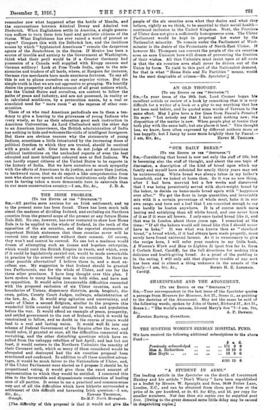THE IRISH PROBLEM.
[To THE EDITOR Or THE " SPEOILTOR."]
Snr,—All parties seem anxious for an Irish settlement, and np to the present none has been found. There has been much talk about the madness of dividing Ireland, and excluding six Northern counties from the general scope of the present or any future Home Rule Bill. No one, however, has ever ventured to show how Home Rule is to be applied to the whole of Ireland, in the teeth of the opposition of the six counties, and the repeated statements of important British statesmen that these counties never will be coerced into any settlement without their consent. Of course, they won't and cannot be coerced. No one but a madman would dream of attempting such an insane and hopeless enterprise, which would rend the British Empire in twain, and which, even if it could be legislatively carried out, would be made unworkable in practice by the armed revolt of the six counties. Is there no other possible alternative? I believe there is, and a most ex- cellent one. My suggestion is that Ireland should be granted two Parliaments, one for tho whole of Ulster, and one for the three other provinces. I have long thought over this plan. I have spoken to many leading men on both sides, and have met no opposition. It would solve innumerable difficulties connected with the proposed exclusion of six Ulster counties, such as boundaries of Unions, dispensary districts, gaols, hospitals, dio- ceses, police, County Court Judges, railways, administration of the law, &c., &c. It would stop agitation and uncertainty, and make of Ulster a second Belgium, similar to the progress this wonderful little country had attained in wealth and population before the war. It would afford an example of peace, prosperity, and settled government to the rest of Ireland, which it would be constrained to follow, and no doubt in the course of years would lead to a real and lasting union. It would well fit into any scheme of Federal Government of the Empire after the war, and would solve, if granted at once, all the difficulties connected with recruiting, and the other disturbing questions which have re- sulted from the unhappy rebellion of last April; and last but not least, it would restore to the Northern Unionists the sanctity of their Covenant oath, which so many of them considered would be abrogated and destroyed had the six counties proposal been sanctioned and confirmed. In addition to all these manifest advan- tages, it would be much fairer to the Nationalists of Ulster, and, if the Ulster Parliament were elected as I propose it should be, by proportional voting, it would give them the exact amount of representation to which they would be entitled. I commend this idea to the favourable and dispassionate consideration of leading men of all parties. It seems to me a practical and common-sense way out of all the difficulties which have hitherto surrounded a settlement of this difficult and harassing Irish question.—I am, Omagh. Ex-M.P. North Monaghan.
[The. difficulty of this proposal is that it would not give the
people of the six counties area what they desire and what they believe, rightly as we think, to be essential to their social health— continued inclusion in the United Kingdom. Next, the Province of Ulster does not give a sufficiently homogeneous area. The Ulster Parliament would be kept in perpetual hot water by the Nationalist minority. To remain under the Parliament of West- minster is the desire of the Protestants of North-East Ulster. if however Mr. Thompson can convert the people of the six counties area no sane Unionist here will dream of preventing the fruition of their wishes. All that Unionists must insist upon at all costs is that the six counties area shall never be driven out of the Union by force. To yiald to this part of the Nationalist demand, for that is what " Home Rule and No Partition " means, would be the most despicable of crimes.—ED. Spectator.]












































 Previous page
Previous page